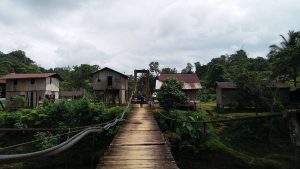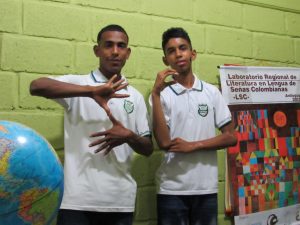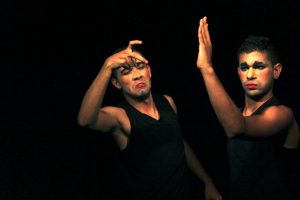Date: 27 november
Time: 13:00 – 15:00
Location: Leiden University, Lipsius building, room 011
Languages: English, LSC, International Sign
Translation: International Sign, English
Program:
13.15 – 13.40 Community based research on indigenous languages: editing Ecuadorian Siona booklets for a diverse audience
Martine Bruil
One of the interest in working with a linguist for the Ecuadorian Siona is to document their stories. These stories contain important information, such as their history and life lessons. The stories were until recently transmitted orally from generation to generation. However, the generation of children nowadays seems to acquire less of this knowledge due to various factors. Therefore, one of the goals of the Siona documentation project was to create a record of stories and to produce story booklets for a diverse audience. In this talk, I will present challenges that we faced and lessons that I learned when editing these beautiful and rich stories told by Siona speakers.

13.40 – 14.05 Colombian Sign Language (LSC), linguistic minority and intangible cultural heritage in Antioquia
Sebastián Arenas, Juan Diego Zuluaga
We present the investigation of the Regional Laboratory in the Colombian Sign Language – LSC – that we began to carry out in 2016 with deaf communities in the department of Antioquia and some regions of Colombia. It is a research in LSC as Native Language of the country, being part of the 68 native languages organized in: 65 indigenous languages, 2 Creole languages, 1 Romany and sign language. With an ethnographic methodology we have visited native communities of the deaf in peasant territories and retired from the city in which there is little government attention and deficiency in educational programs. We conducted LSC training workshops with deaf children, youth and adults recovering the dialectal forms of the language in the different regions of the country to strengthen the Deaf Culture as cultural heritage.

A first phase of diagnosis and exploration of the territory and the deaf communities has been carried out, since they are retired places in the mountain. We have visited 17 towns and cities where there are deaf schools and associations finding an ethnic and linguistic diversity that needs to be strengthened, such as deaf Afrodescendants, indigenous deaf Embera Katío, deaf adults with an undocumented knowledge and deaf children immersed in contexts of little literacy. These situations are traversed by the phenomenon of the country’s armed conflict. The Conference presents a cartographic summary of the findings of the Laboratory to give an account of the reality of the native deaf communities of Colombia and the process of appropriation of the LSC as the native language of the country; Taking into account that the LSC was formalized by the government in 1996, with 22 years of official status, it is a process of recognition and inclusion that requires in-depth research with people and territories.
14.20 – 15.00 Deaf Theatre La Rueda Flotante
Two deaf Colombian actors present a pantomime performance where they narrate how Colmbian Sign Language was protected and transmitted in the first oralizing schools.

Direction: Juan Diego Zuluaga Dramaturgy in LSC: Sebastian Arenas, deaf person Deaf actors: Cristian Jaramillo and Sebastian Arenas Music: Laudello, duet of guitar Colombian Asesir at Pantomima: Edwin Montoya Scene assistant and Production: Catalina Zuluaga